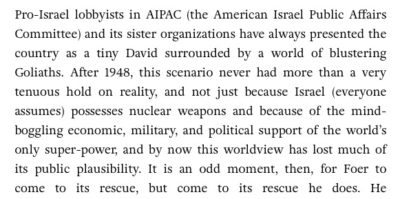Pre-Shabbat Jewish Literary Links

Shabbat shalom.

Shabbat shalom.
Here is the original, unedited full text (including paragraph breaks and a final sentence) of a letter that Poets & Writers has now posted online.
Dear Poets & Writers:
At the outset of “Dear President: A Message for the Next Commander in Chief From Fifty American Poets and Writers” (September/October 2016), you declared:
It turns out something pretty great happens when you ask writers to convey, without a lot of political grandstanding, what is most important to them. The contours of some of America’s biggest issues—education, health care, gun violence, racism, immigration, and the environment among them—start to come into sharper focus, the collective discourse rises above the rhetoric of political pundits, and the pomp and circumstance of the political process falls away, so that we are left with a discussion of real problems, real concerns, and, if not solutions, then at least some honest ideas that may inspire action of real, lasting value.
Unfortunately, among many fine contributions that may indeed meet those high ideals, your feature includes some that represent “political grandstanding” at its worst; they evoke an anti-Israelist “collective discourse” composed of the precisely the sort of distressingly familiar rhetoric that you claim the feature to be “rising above.” Far from “sharpening focus” or offering “honest ideas,” these paragraphs present what might most charitably be described as incomplete and highly arguable accounts of a longstanding conflict.
What is inarguable, however, is that statements you chose to include—in particular, those from Ru Freeman, Emily Raboteau, and Naomi Shihab Nye—omit even the slightest sense of the matter’s complexity and history. (To its credit, a fourth statement to address this subject, Tom Spanbauer’s, at least suggests that Palestinian Arabs bear some responsibility for the ongoing difficulties.)
That among all of the world’s nations and national groups your feature singles out for excoriation, more than once, only the planet’s sole Jewish state is distressing enough. That you’ve chosen to preface such anti-Israelist polemics with your laudatory introduction—rather than a more conventional statement clarifying that your contributors’ opinions are only their own—is profoundly disturbing to this longtime subscriber and past contributor. I expect better from Poets & Writers.
Erika Dreifus
New York, NY

Speaking of Rosh Hashanah–let me wish you all a Shanah Tovah–as well as a Shabbat Shalom.

Ah, when a pro-BDS* academic reviews Jonathan Safran Foer’s new novel for a literary website! Such…interesting…historical/political perspectives can result.
As it happens, the site posted another review of the same title on the same day—this one, by an author who actually focused on the book. Imagine that.
(*I don’t want to link to evidence about the reviewer’s pro-boycott position, because I don’t need the nuisance of a pingback. But you don’t really need me to do it: Google is our friend, friends.)
“Though they will hear its rhetoric and see its demonstrations, few students will ever visit the BDS website, where one learns that the movement is avowedly part of the Palestinian national struggle against the very existence of the State of Israel. BDS materials say nary a word about the partial responsibility of the corrupt Palestinian government in the West Bank or the murderous Hamas regime in Gaza for the failure of the peace process thus far. One hears a great deal from BDS and affiliated groups like Jewish Voice for Peace about Jewish and Israeli culpability — but nothing about mistakes made on the Palestinian side, oppression committed by it, the blatant anti-Semitism built into its policies and publications. BDS is silent about the many countries that are guilty of abuses far worse than those charged to Israel.”
Source: Arnold M. Eisen (via JTA)